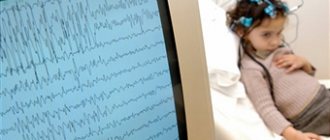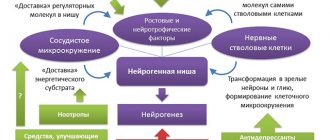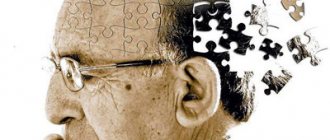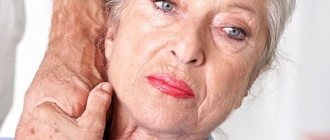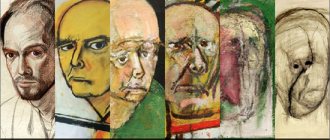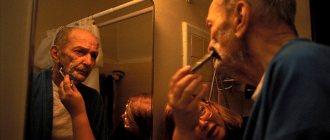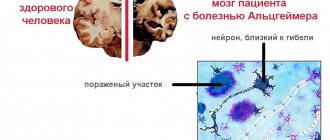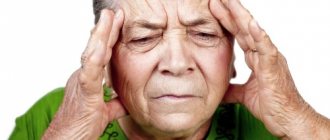Ensuring brain function takes up a fifth of our body's total energy - not surprisingly, such intensive work leads to the formation of a kind of "waste", some of which can be toxic. One of these waste products is amyloid protein, an excess of which researchers believe is the main cause of Alzheimer's disease.
Fortunately, nature took care of the timely “disposal” of dangerous waste: protein, which accumulates in the space between brain cells during the day, is destroyed during the night’s rest. Adequate sleep is truly essential for our health: not only our body, but also our brain needs long, deep rest. A study conducted by specialists from Uppsala University (Sweden) confirmed: in people who regularly do not get enough sleep, the risk of developing Alzheimer's disease increases by 1.5 times. Other consequences of sleep deprivation include a more rapid decline in brain volume and especially in the areas responsible for cognitive abilities, decreased concentration, and poorer memory.
New therapy method
Back in 2001, Ulrich Werth determined that severe neurological symptoms could be corrected and controlled through acupuncture. Moreover, the impact must be constant. Therefore, he decided that it was necessary to use implant acupuncture. These implants provide constant production of substances that stimulate the production of dopamine in the human brain and become a catalyst for improving the symptoms of neurological pathologies. The new method aroused wide interest in medical circles, and several scientific publications were devoted to it.
The therapy is based on auriculotherapy, i.e. acupuncture of the ear. This is due to the fact that since ancient times it has been known that more than 330 active points are hidden on the auricle. By influencing some of them it is possible to influence the brain. And this is precisely what makes it possible to successfully correct the condition of parkinsonism and Alzheimer’s syndrome, since many destructive processes take place there.
In addition, acupuncture helps improve a person’s condition in diseases such as multiple sclerosis, restless leg syndrome, senile sclerosis and others. To achieve the result, mini-implants made of titanium are implanted under the skin of the ear. They even came up with a beautiful name for them: eternal needles. They constantly stimulate active points and lead to the regeneration of brain cells. All this is proven by research in the form of brain scans during the procedure. It should be noted that this method has no side effects, as it gives an impetus to the regenerative powers of the body.
After installation of the implant, a decrease in symptoms is observed almost immediately in most patients. Due to this, the dosage of medications can be reduced. The first effect can be assessed immediately after the procedure. A stable result will be observed after a few months. After a year (it all depends on the person’s condition), it is necessary to undergo a re-examination at the clinic to evaluate the therapy process.
Photo: Vert Therapy
In 2020, needle therapy was tested in accordance with all European Union regulations. They involved real patients with neurological pathologies, or more precisely, with Parkinson’s disease. The commission concluded that the method promotes drug treatment of pathology, and also helps avoid increasing the dosage or prescribing new, stronger drugs.
The main advantage of the clinic is that the cost of treatment is not as high as it might seem at first glance. The procedure itself will take about 2 hours and can be compared in complexity to dental surgery. It’s enough just to take a step towards your health and at the same time relax on the shores of the Mediterranean Sea. The clinic will resolve all issues related to the trip: an invitation to obtain a visa, registration of a hotel and air travel, and much more.
A completely new hypothesis
Researchers are now reporting the discovery of two toxic enzymes that P. gingivalis uses to break down human tissue. These protein-digesting enzymes are called gingipains, and they have been found in brain tissue in cognitive disorders. The team also found genetic material from P. gingivalis in the cerebral cortex, an area involved in conceptual thinking. Low levels of P. gingivalis genetic traces and protein accumulation were also found in the brains of people without Alzheimer's disease.
It is known that amyloid and tau can accumulate in the brain for 10 or 20 years before symptoms of dementia begin. This shows that P. gingivalis does not always end up in the brain as a result of Alzheimer's disease—but it may be a cause. Inoculation of mice with P. gingivalis resulted in brain infection, amyloid formation, tau protein entanglement, and nervous system damage, suggesting a cause-and-effect relationship.
Fears of relatives and patients
When people are faced with Parkinson's or Alzheimer's disease, the first feeling that comes over them is panic. Moreover, this applies to both the sick themselves and their relatives. The first become scared and don’t want to turn into a burden for their loved ones, the second want to find out what can be done to slow down the destructive processes in the body of a person close to them. Both diagnoses are degenerative, so the thought that vitality will fade is a heavy burden for both the patient and all family members
The search begins for doctors, methods, drawing up a plan of procedures and other activities that accompany each chronic and incurable condition. And today there are effective options that allow you to maintain a high quality of life even with such complex diagnoses.
Germ theory
In 2020, researchers discovered that amyloid acts as a defense against bacteria. This protein is an antimicrobial compound formed when bacteria are in danger of entering the brain. Bacteria were found in the brains of people suffering from Alzheimer's disease, but it was not clear whether they were the cause of the disease or could simply penetrate the brain damaged by the disease. Several groups have studied Porphyromonas gingivalis, a major bacterium involved in gum disease, which is a risk factor for Alzheimer's disease. It was found that:
- Porphyromonas gingivalis invades and causes inflammation in areas of the brain affected by Alzheimer's disease;
- gum infections may worsen symptoms in mice genetically grafted with Alzheimer's disease;
- The bacterium causes nervous system damage and amyloid plaques in healthy mice.
Alzheimer's disease - symptoms and signs
Alzheimer's disease is a complete and irreversible loss of human memory. More and more people of different ages are losing memory not only of others, but also of themselves. There are currently about 40 million people on the globe who have been exposed to this little-studied disease.
Memory is information stored in the human brain, on the basis of which he orients himself in space and society. A person affected by Alzheimer's disease is a person who has lost this information and a coordinate point in space. This disease does not choose - its victims were people of different ages, status and intelligence.
On the one hand, memory has been sufficiently studied by scientists, but on the other hand, there are a lot of mysteries in it. It has now been proven that memory does not directly depend on intelligence. Scientists still do not know the cause of memory decay. There are no medications to stop Alzheimer's disease yet, so for millions of people this diagnosis is like a death sentence, because the end of the disease is the same: memory turns into a blank slate, and as a result, a person becomes like a newborn child without memories. Nature does not endow everyone with phenomenal memory, but this gift is not eternal: with age, memory becomes worse, even among child prodigies.
Memory is the first function that begins to deteriorate over the years. Memory begins to suffer, according to some studies, from the age of 23-25, that is, when a person is at the peak of his abilities, cognitive in memory. Over time, memory changes its psychological structure. When a person remembers information as an adult, he sets himself the task, first of all, to remember. And involuntary memory, that is, information that is remembered in life along the way, weakens over time.
Memory deterioration is not as scary as its irreversible loss. The initial symptom of Alzheimer's disease is, of course, a memory disorder, since memory deterioration is a mandatory sign of this disease. It all starts with little things: the disease disguises itself as ordinary absent-mindedness for a long time, and without treatment, it only gets worse - the person’s memory begins to fail more and more often. Losing memory irrevocably means simply going nowhere. The onset of the disease always occurs in the same way, according to the law that inevitably closes the life cycle, uniting its beginning and end - the law of progressive amnesia. In the same order in which the child gains knowledge, in the same, only in reverse, order, it will be lost during the development of Alzheimer's disease.
First, memory is lost for the events of the last days and hours. A person forgets the location of such small things in the house as glasses, money, watches, keys. Then the person begins to forget to turn off the iron, the pan on the stove, the kettle, and then begins to get lost in familiar places on the street. The next stage is the loss of information from the recent past from memory - a person has difficulty remembering yesterday’s or this morning’s events in his life.
Difficulties begin in verbal counting and monetary settlements. The most common situations are when an elderly person hides his money, and then cannot find it and ties his closest relatives who live in the same apartment with him to this situation. Memory of the more distant past, memories of youth and childhood last the longest. It often happens that at the initial stage of the disease there is some revival and brightness of past memories. Old people love to talk about their youth. This property is inherent in the memory of an elderly person, but with the onset of illness, it takes on grotesque forms.
Alzheimer's disease, like a cancerous tumor, gradually “eats” memory and one day there comes a moment when information about the experience, about loved ones, about oneself completely disappears from the brain, that is, a person forgets everything - his life in adulthood, youth, childhood. And as a result, a person forgets how to hold a spoon to eat, how to dress, etc. He does not remember the names and surnames of his loved ones, does not remember anything about himself. In this situation, the law applies that recent information is forgotten first, that is, first a person will forget those who are less interesting to him, then those closest to him and, finally, himself. The main symptom - a sharp decrease in memory - is not the only sign of the onset of the disease. At the same time, the person’s character begins to change. An elderly person becomes irritable and easily excitable, which often leads to conflicts in relationships with his close relatives. Memory disorder, personality change - this happens to many pensioners, but relatives often do not pay attention to it.
Senile insanity, as Alzheimer's disease and other age-related dementias are simply called, are considered common in Russia. The main factor in the development of Alzheimer's disease is indeed age: according to statistics, 8% of patients are elderly people 70 years of age, and 20% of patients are 90 years of age. However, it is a strong misconception to believe that memory loss in old age is the norm, since many centenarians retain excellent memory.
Don't give up
It is important to understand that you need to find a method that will help slow down the development of the disease. Indeed, in this case, a person with such a complex diagnosis is still quite capable of living a full life and not fully feeling the influence of his pathology. One of the modern clinics is located in Valencia (Spain), in which medical specialists are engaged in the study of these nervous degenerative diseases and have already gained a wealth of experience and wide practice. Terapiawerth is a clinic where we are sure that these diseases are not a death sentence. And it is quite possible to live with them, and even quite fully.
The founder of the clinic and one of the main methods used for treatment here is Dr. med. Ulrich Werth. He graduated with honors from the University of Rostock in Germany with a specialization in neurology and psychiatry, so he knows almost everything about neurological pathologies. He also received additional training in acupuncture in India. Today the doctor is known as the creator of implant acupuncture.
He managed to create a team of like-minded people, including neuropsychologists and physiotherapists. Together, they set themselves the goal of improving the quality of life of their patients suffering from severe neurological illnesses and relieving many of the symptoms that accompany these diseases.
Terrible symptoms
Parkinson's disease is a slow but progressive death of human nerve cells that are responsible for motor function. Among the first possible symptoms of the pathology are muscle twitching (trembling): mainly in the hands, including at rest. Most often, the problem begins to develop in people aged 55-60 years, but today more and more cases are being observed in younger people.
As the pathology develops, a person loses his activity, his mental abilities decrease, and vital functions begin to fade. Parkinson's disease is one of the most difficult diseases to treat. Medicines do not restore nerve cells, but only reduce symptoms and carry a time bomb called “side effects.”
With Alzheimer's syndrome, nerve cells begin to die, connections between them are broken, plaques and tangles form, and pathological proteins begin to accumulate in tissues. All this becomes the reason that a person gradually (the speed of destruction processes is individual) loses his thinking and sense of self. He simply turns into a shell that no longer thinks independently and needs constant care.

